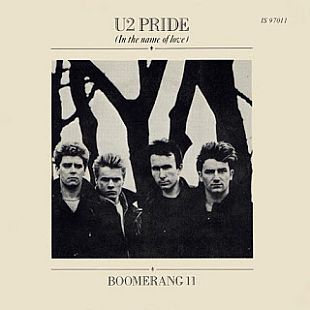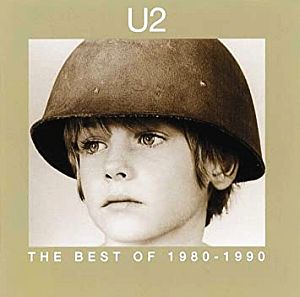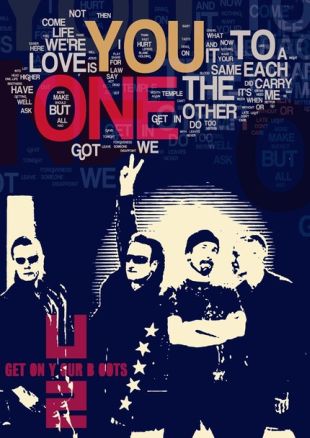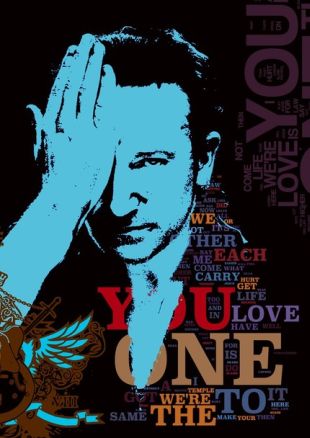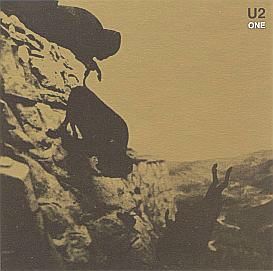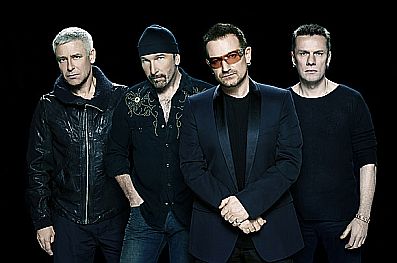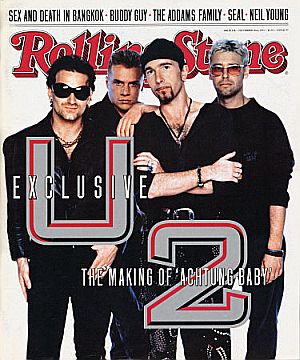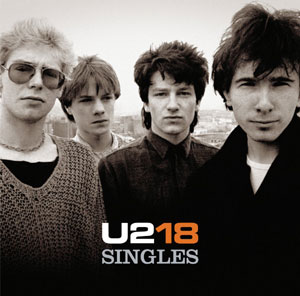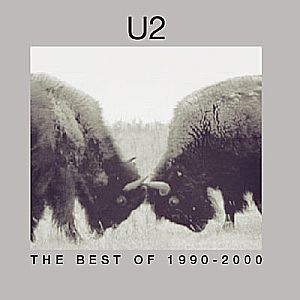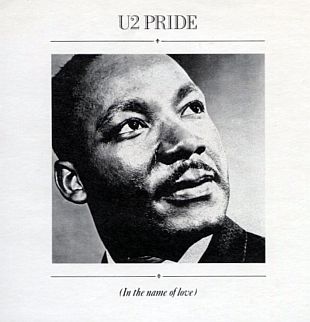 Back cover of U2's “Pride” single, with photo of Dr. Martin Luther King, and on some versions, a quotation excerpted from King’s 1963 book, “The Strength to Love.” |
In 1984, the Irish rock group U2 included two songs in homage to Martin Luther King on their album, The Unforgettable Fire.
The first song, “Pride (In the Name of Love),” is a song about Martin Luther King’s non-violent activism in the U.S. civil rights movement. This song was released as the album’s lead single in September 1984 and became a top hit and one of the group’s most popular songs.
The second song, “MLK,” which closes the album, is a brief lullaby; a pensive piece with simple lyrics.
U2 frontman Bono (Paul Hewson) and his bandmates came to the first of these songs in a somewhat round about way with some odd political beginnings.
The music and melody for the song came before the lyrics, as it was late 1983 when some of the music for the song had been worked up and recorded. But the lyrics and the song’s subject matter were a different story. Initially, the song was intended to focus on Ronald Reagan’s pride in America’s military power as a possible theme – as a critique, no doubt. But Bono soon had another idea based on some reading he was doing at the time.
Bono was influenced by two books, a biography of Malcolm X, and another book – Let The Trumpet Sound: The Life of Martin Luther King, Jr., written by Stephen B. Oates. These books appear to have set Bono thinking about the different approaches to achieving civil rights in the U.S. – the violent and the non-violent – each, respectively represented by their leaders, Malcolm X, calling for revolution, and MLK, advocating peaceful, nonviolent protest in the mold of Mahatma Gandhi. Thus, a couple of the lines from the resulting song could be taken to reflect these contrasting approaches – “One man come here to justify/ One man to overthrow.” But in any case, the general thrust of the song came to honor MLK’s peaceful approach – “in the name of love.”
|
“Pride (In the Name of Love)” One man come in the name of love In the name of love! One man caught on a barbed wire fence In the name of love! …Nobody like you Mmm…mmm…mmm… Early morning, April 4 In the name of love! |
Still, not all of Bono’s bandmates thought that using Martin Luther King as a focus for the song would be a good idea – at least at first. The Edge (David Howell Evans) would later recount of the song some years later: “Because of the situation in our country [i.e., Ireland] non-violent struggle was such an inspiring concept. Even so, when Bono told me he wanted to write about King at first I said, ‘Woah, that’s not what we’re about.’ Then he came in and sang the song and it felt right, it was great. When that happens there’s no argument. It just was.”
Music Player
“Pride (In The Name of Love)”
In the U.S., “Pride” became U2’s first top 40 hit, reaching No. 33. In the U.K. it rose to No. 3 on the UK Singles Chart and also cracked the Top Ten in other European markets. The song also hit No. 1 in New Zealand. U2 at the time was continuing their commercial breakout, following the success of their 1983 album War, their firt No. 1 U.K. album.
“Pride (In The Name of Love)” would become one of U2’s most popular songs through the years, often played at their many concerts around the world. Clips from Martin Luther King speeches were often shown on video screens during the song’s airing at concert performances.
In the 1980s, Bono described “Pride” as “the most successful pop song we’ve ever written. Pop for me is an easily understood thing, you listen to it and you comprehend it almost immediately. You relate to it instinctively….” Not all critics agreed, however. Rolling Stone’s Kurt Loder for one wrote that “‘Pride’ gets over only on the strength of its resounding beat and big, droning bass line, not on the nobility of its lyrics, which are unremarkable.” And a few others felt that “pride” was not quite the right word for King. The song also contains one historical mistake setting King’s shooting as “early morning, April 4”, when it actually occurred after 6 pm. Bono has acknowledged the error and in live performances he often replaces the lyric with “early evening…”.
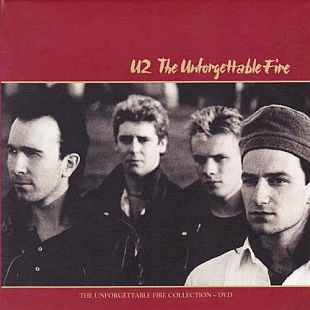
CD cover for “The Unforgettable Fire Collection.” The 1980s photo shows U2 band members, from left: The Edge, Adam Clayton, Larry Mullen, Jr., and Bono. Click for 2CD-DVD set.
On the back cover of the “Pride” single shown at the top of this article is a photograph of Dr. King, which on some versions included a quotation from King’s 1963 book, The Strength to Love, printed below the photo as follows: “Hatred and bitterness can never cure the disease of fear; only love can do that. Hatred paralyzes life; love releases it. Hatred confuses life; love harmonizes it. Hatred darkens life; love illuminates it.” In January 2009, at the “We Are One” celebration of musicians and public speakers during the first inauguration of U.S. President Barack Obama in Washington, DC., U2 performed “Pride (In The Name of Love)” before some 400,000 people assembled near the Lincoln Memorial. At the end of the performance Bono remarked to the audience that King’s dream was “not just an American dream” but also an Irish dream, a European dream, an African dream, and more, as he began his next song, “City of Blinding Lights.”
|
“MLK” Sleep If the thundercloud Mmm…mmm…mmm… Sleep If the thundercloud |
MLK Song. U2’s other song in tribute to Martin Luther King – titled “MLK” – is also on The Unforgettable Fire album. It was written, some say, as an elegy to King. The song has a dreamy, lullaby quality to it which seems to be suggesting, as if speaking to a generation of children and saying, “though the road ahead may have thunderclouds and rain, this too will pass, and your dreams can still be realized. But sleep now, my child, sleep.”
Music Player
“MLK”-U2 (2:34)
The Unforgettable Fire album, meanwhile – which includes the two MLK songs – peaked at No.1 on both the U.K. and Australian album charts in 1984. (“The Unforgettable Fire” is a reference to the WWII nuclear bombing of Hiroshima, Japan during WWII and a victims’ exhibit of that name that U2 visited at the Chicago Peace Museum while on tour in 1983. However, the U2 song of that name, in its lyrics, does not make any plainly-stated or direct connection to the bombing or the victims, though the song is said to be “an atmospheric composition,” more abstract and impressionistic).
In the U.S., The Unforgettable Fire peaked at No.12 on the album charts and was certified multi-platinum by the RIAA with 3 million units sold. The album overall was something of a departure from what U2 had been doing and was also experimental in part as they were looking for something that was “a bit more serious, more arty,” as one description noted. The Edge, for one, had been drawn to the work of Brian Eno and his engineer Daniel Lanois, who produced the album.
King Center Award. In January 2004, nearly twenty years after The Unforgettable Fire had first appeared, Bono and U2 would be recognized by Coretta Scott King and the King Center in Atlanta, Georgia for the MLK tribute songs in the album. Bono traveled to Atlanta to receive the honor at the annual “Salute to Greatness” Awards Dinner and he also attended a number of related events there to honor what would have been Martin Luther King Jr.’s 75th birthday.
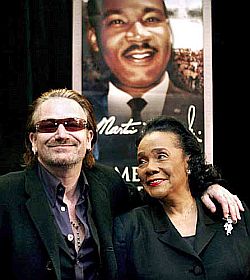
January 17, 2004: Bono of U2 with Coretta Scott King, widow of Dr. Martin Luther King Jr., at news conference in Atlanta. GA where Bono received a King Center award for U2's MLK tribute music. Photo /W.A. Harewood/AP.
“We despaired for the lack of vision of the kind Dr. King gave to people in the [American] South,” Bono explained, accepting the award from King’s widow, Coretta Scott King. A year earlier, Bono had been nominated for the Nobel Peace Prize for his work to relieve third world debt and promote AIDS awareness.
At the King Center, Coretta Scott King said in making the award: “We are fortunate this year to … honor Bono for exemplifying many of the qualities that my husband, Martin, indicated were imperative to moving our society into the beloved community of which he so often spoke.”
Other stories at this website with civil rights-related content can be found at “Civil Rights Stories,” a topics page with links to 14 stories, such as “Strange Fruit” (Billie Holiday history) and “Reese & Robbie” (Jackie Robinson & Pee Wee Reese). See also “Buses Are A’ Comin’,” a detailed story about the 1961 Freedom Riders. Another story on U2 at this website profiles the history of their 1992 song, “One,” and U2 and Bono are also included in the “iPod Silhouettes” story. Additional stories are found at the “Annals of Music” page or on the Home Page. Thanks for visiting – and if you like what you find here, please make a donation to help support the research and writing at this website. Thank you. – Jack Doyle
|
Please Support Thank You |
____________________________________
Date Posted: 16 August 2013
Last Update: 15 January 2021
Comments to: jdoyle@pophistorydig.com
Article Citation:
Jack Doyle, “U2’s MLK Songs: 1984,”
PopHistoryDig.com, August 16, 2013.
____________________________________
Sources, Links & Additional Information
“U2,” in Holly George-Warren and Patricia Romanowski (eds), The Rolling Stone Encyclopedia of Rock & Roll, New York: Rolling Stone Press, 3rd Edition, 2001, pp.1022-1024.
Neil McCormick, U2 by U2, London: HarperCollins, 2006, 352pp.
Bill Graham and Caroline van Oosten de Boer, Complete Guide to the Music of U2, Omnibus Press, 2nd edition , August 2004, 92pp.
“Pride (In the Name of Love),” Wikipedia .org.
“Pride (In The Name Of Love) by U2,” Song Facts.com.
“U2,” Wikipedia.org.
Geoffrey Himes “Ireland’s U2, Rocking the Conscience,” Washington Post, December 5, 1984, p. C-1.
Stephen Holden, “Rock: The Irish Quartet U2 at Radio City Music Hall,” New York Times, December 6, 1984.
Robert Palmer, “U2 Starts National Tour on a Political Note,” New York Times, April 4, 1987.
Robert Hilburn, “Pop Music: U2’s Pride (In the Name of Songs) : Achtung, Babies: Bono and Edge Evaluate One Critic’s Choices for the Group’s 10 Best Recordings, from ‘I Will Follow’ to ‘One’,” Los Angles Times, Septem- ber 12, 1993.
Stephen M. Silverman, “Bono Likened to Martin Luther King,” People.com, January 20, 2004.
Associated Press, “Bono Accepts King Center’s High Honor,” Houston Chronicle, January 19, 2004.
Jillian Mapes, “10 Songs Honoring Dr. Martin Luther King, Jr.” Billboard, January 13, 2013.
“Irish Rock Star, Rare With Attitude – Bono Wins King Center Award,” Global Com- munity Counseling.
The Martin Luther King, Jr. Center for Nonviolent Social Change, Atlanta, Georgia, Website.
_____________________________
